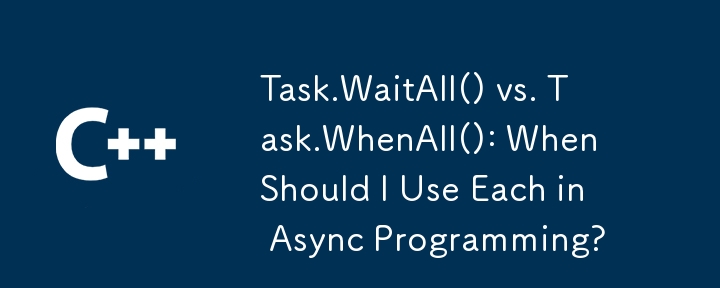

Deeply explore the difference between Task.WaitAll() and Task.WhenAll() in .NET asynchronous programming
In .NET asynchronous programming, it is crucial to understand the difference between Task.WaitAll() and Task.WhenAll() in Async CTP. These two methods serve different purposes, and their characteristics also affect the performance and flow of your code.
Task.WaitAll()
Task.WaitAll() is a blocking operation that blocks the current thread until all tasks in the specified array are completed. This means that the method will only return after each task has been completed, no matter how long it takes.
Task.WhenAll()
In contrast, Task.WhenAll() returns a Task instance that represents the completion of all tasks in the specified array. This means that the method does not block the current thread but continues executing the next line of code. The returned Task will be completed when all input tasks have been completed.
When to use which?
The choice between Task.WaitAll() or Task.WhenAll() depends on the specific needs of your code. Here are some real-world use cases:
When to use Task.WaitAll():
When to use Task.WhenAll():
await keyword). Code Example
Consider the following code snippets to illustrate different use cases:
// 使用 Task.WaitAll() 等待任务
var tasks = new[] { Task.Delay(1000), Task.Delay(2000), Task.Delay(3000) };
Task.WaitAll(tasks); // 阻塞当前线程,直到所有任务完成
// 使用 Task.WhenAll() 创建延续任务
var tasks = new[] { Task.Delay(1000), Task.Delay(2000), Task.Delay(3000) };
var continuationTask = Task.WhenAll(tasks); // 返回一个任务,当所有输入任务完成后该任务完成The above is the detailed content of Task.WaitAll() vs. Task.WhenAll(): When Should I Use Each in Async Programming?. For more information, please follow other related articles on the PHP Chinese website!
 The latest ranking of the top ten exchanges in the currency circle
The latest ranking of the top ten exchanges in the currency circle
 What to do if the CPU usage is too high
What to do if the CPU usage is too high
 What currency is USDT?
What currency is USDT?
 How to set up hibernation in Win7 system
How to set up hibernation in Win7 system
 What are the java flow control statements?
What are the java flow control statements?
 Python online playback function implementation method
Python online playback function implementation method
 matlab colormap function usage
matlab colormap function usage
 Connected but unable to access the internet
Connected but unable to access the internet




